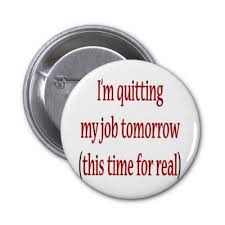I’m Outta Here
 I recently wrote this sentence in one of my blogs:
I recently wrote this sentence in one of my blogs:
“Companies talk about their own unique war on talent, how they are best suited to attract the best there is, and spare no effort to do so.“
A friend of mine, a highly regarded specialist in her field outside her company, sent me her comments about how talent walks out the door, and well worth reprinting.
Here is what she wrote:
What companies often don’t realize is that after they bring on highly regarded talent, their internal policies may waste their hiring investment, often driving such talent out the door.
For example, I work for an MNC with clearly defined internal structures and policies. In the last few years, it has pushed complicated, ever-changing administrative procedures down to the individual.
They eliminated many administrative support positions to make themselves “lean and mean” and improve the bottom line.
Expenses, travel and several HR functions are now all “self-service”, requiring several hours of training to learn how to use each application, tweaked regularly to reflect the latest regulatory requirements in the 50+ jurisdictions in which the company operates.
To book business travel or obtain reimbursement for expenses, several hours are required, taking away from highly specialized work I was hired to do. There is no support staff to take care of these functions, so no choice.
In their restructure, only those at the very top can make cross-business unit decisions, resulting in missed business opportunities. For example, there is a global conference to be held in our city later this month. Several of our business units have people working here who should go. Sending them to the conference- cost only (no hotel room required) would likely boost sales and more than pay for the conference fees. However, only one local staff from one business unit will attend. Why? No one can-or will- make cross-business unit decisions.
Open offices do not work; believe it or not, some functions still require a relatively quiet environment. Office rent in our city is expensive, and space is at a premium. All staff are in open offices, without considering that some work still requires quiet. If sales people are seated next to those drafting technical content, it often results in frustration, putting it mildly.
All these can be interpreted by “talent” that their work is undervalued. They may well leave, and losing people with valuable technical expertise, experience, as well the money and time involved in recruiting new talent costs the company dearly. But they often don’t see it, assuming everyone is easily replaceable, or justifying an exit as a ‘bad fit.’
How to prevent brain drain? Depends on the company, but I recommend the following, at least for our company management:
Hire a strong administrative assistant to take care of administrative procedures for one or more business units. Professional staff will be more productive and more motivated.
Assuming open offices, at least, have the facilities management team do a ‘walk around’ and send a survey to the professional staff on a floor. Noise causes stress, that is well documented. Designate one part of the office as a “quiet area” for those who need a low noise level. Consider user needs when the next fit-out is done.
Getting business units to work together is an age-old problem in company management. Even our CEO has admitted in town halls that the company is too silo-ed. The only result so far are multiple videos on the subject and hiring a Chief Innovation Officer. Push liaison between business units to a local level for low cost matters.
Finally, find a way to harvest and harness ideas generated by staff. They may have valuable ideas on how grow the business, and it is consulting advice the company does not have to pay for. If my company had any real channels, you wouldn’t be reading this!
And by the way, my friend is now considering other options (not surprisingly) in case you’d like to talk with her..













